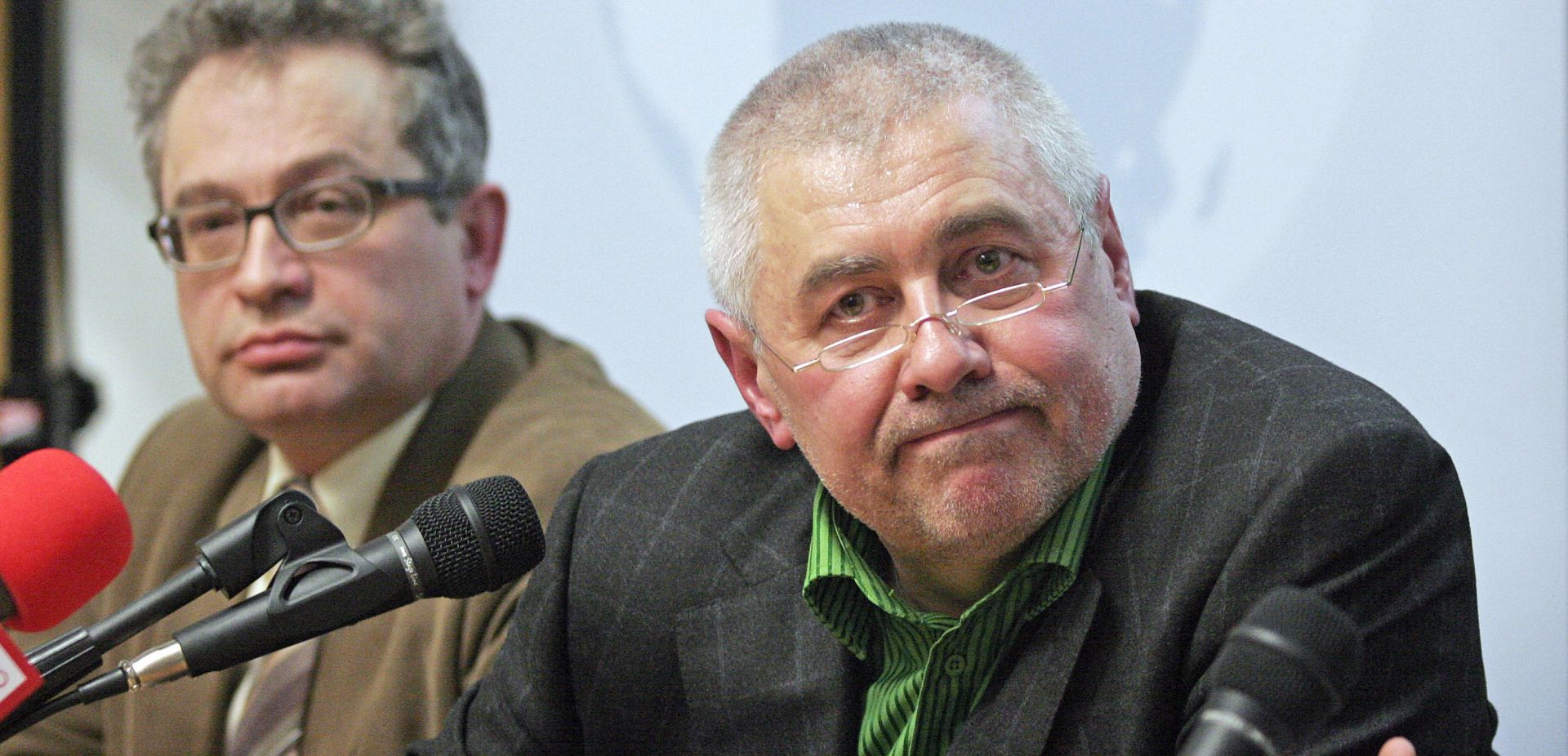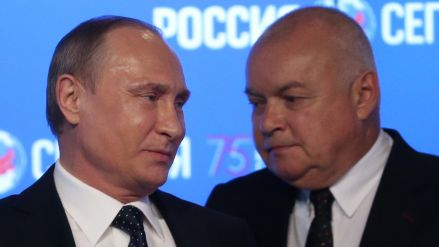What does it mean?
It’s term made after meeting in Belovezha, where Yeltsin decided to dissolve the Soviet Union. It depicts people who brought about the collapse of the Soviet Union by ignoring material conditions, and their own living situation. To a large extent, the term referred to the Moscow intelligentsia, which supported reforms that essentially impoverished them greatly. Reforms from Yeltsin's first term, hit people’s pockets, particularly the middle class, such as teachers and the technical intelligentsia, to a large extent. Pavlovsky argued that those people – i.e. the infantile, blind people – only realised how much evil they had done when it was too late. Therefore, ‘pedagogical authoritarianism’ must be introduced to teach them how to live in a state, in a democracy; to teach them the basics of the market economy, how to dispose of their material resources so as not to be robbed by the many crooks, etc.
Authoritarianism would teach democracy [laughs]. Nonetheless, the situation in Russia to some extent justified the preaching of such views, as fraud, financial pyramids, etc. which were the order of the day in the 1990s.
The problem is that there was too much authoritarianism in Russia, and only a little education. Pavlovsky found this out, as Putin's team eventually came to the following conclusion: ‘We’ve already had enough of this democracy.’
In a 2007 op-ed entitled ‘The Machines of Power,’ you set Gleb Pavlovsky's philosophy in the broad context of socio-technical techniques, starting with panopticism and Potemkin villages. You wrote that ‘when we read Pavlovsky's texts, we are dealing with nothing but the manipulation of the president's gaze, i.e. politics in the Potemkin sense of the word.’
I set Pavlovsky in this context, but in fact, his whole story is quite banal. He was indeed an intelligent man, with a reputation as a penetrating analyst. However, his writings are convoluted, laden with various linguistic flourishes that contribute little. When he appeared in the media, however, his speeches were interesting. In fact, for a time he hosted a political programme on television. This was a forerunner of what Vladimir Solovyov [a TV and radio journalist, pro-Putin propagandist - ed.] is currently doing – only at a much lower intellectual level.
Gleb Pavlovsky was an example of an intelligent, educated man with a dissident past who tried to make a career for himself within the court of the ruler. The higher he climbed in the hierarchy, the more fascinated he became with this world. For the sake of his career, he was willing to get into all kinds of trouble to keep his position. I was always surprised at how Pavlovsky, with his knowledge and historical experience, could have believed in these antics. History teaches us that it was set to fail.
You mentioned earlier that he was responsible for black PR. What other propaganda techniques did he use?
For example, he introduced the term ‘Putin majority’. This was an important term because it meant that Vladimir Putin had a permanent electoral base and that the majority of the Russian public had a close relationship with him. He also called Putin a ‘semiotic machine’ or a ‘communication machine’. He may have been the one who invented the annual phone calls with the president, during which people could telephone him directly and tell him about their problems.
During a lecture in Poland in 2014, Gleb Pavlovsky said that the Russians had set up an uninterrupted 24-hour news ‘series’ with set themes and protagonists. The series would contain daily dramatic events, and Vladimir Putin would be the only positive protagonist of this ‘series’. He added that it is built from various fragments of real life. It would be supervised by visual-effects masters, high-class directors and scriptwriters from the Ostankino studio.
There are increasing problems with this series. Vladimir Putin is already in poor health. In media coverage, he is often very passive. I didn't quite understand Gleb Pavlovsky's train of thought that Putin is an excellent political communicator. After all, he is not a 'public' politician at all. Apart from the early days of his rule, he does not contact people in a spontaneous way. For many years, if he has had meetings with the so-called representatives of the people, they are security officials. He does not contact simple, ordinary citizens at all. In January, he had a meeting with the mothers, sisters, and wives of soldiers killed in the war. It turned out that they either belong to the ruling party or hold positions in various local government bodies.
The Russian media, however, through people like Pavlovsky, have elevated him to superhero status.
In the first decade of Putin's rule, there were two heroes in the media. First, there was Putin, who was everywhere and was supposed to satisfy the Russians' need for a young, energetic president. And that's what he looked like – at least compared to Yeltsin, who was in poor health throughout his presidency.
Secondly, the band Tatu, two girls who started performing as teenagers. They had an expressively lesbian image – this was the idea of the band's producer because, in reality, they are not lesbians. Tatu is the biggest commercial success in the Russian entertainment industry. Among other things, the band took part in the opening ceremony of the Sochi Olympics.
I don't think such an image would go down well in present-day Russia?
Back then, in matters of morals, the rule was ‘live as you want, nobody cares’. Now there is a ban on LGBT advocacy. There has been a complete change of priorities.
Pavlovsky’s entire political technology was set in the context of the culture of the previous cabinet. Anyway, he was no longer needed during Putin's second election campaign in 2005, when he was sidelined.
Perhaps he endangered himself during the 2004 election campaign in Ukraine, advocating for Viktor Yanukovych. There were ironic claims that Pavlovsky had to face a real opponent for the first time. And this was a duel that he lost.
The Russians have a problem because they do not understand other political cultures. They came to Ukraine with the absurd idea of holding elections. After losing the 2004 elections, Marat Gelman, a popular TV manager (one could also say: political technologist) in the 1990s, said: “It made no sense. We don't understand at all how election campaigns should be run. We don't understand the political and cultural context. Ukraine is a completely different country from Russia, so it was impossible to do it the way it is done in Russia.”
But Gelman, who admitted his mistake, was an exception. There were plenty of Russian political technologists in Ukraine at the time. They had all left with Yanukovych and were no longer needed by anyone, for anything.
One of them, Timofei Sergeitsev, wrote a manifesto at the beginning of the war in which he stated that Ukrainians had to be divided into three categories: the first group should be shot, the second should be sent for re-education in labour camps, and the third could perhaps be recruited.
Not very eloquent.
This is how Russian political technology ended.
Is there a place for political technologists in today’s politics?
There is a war now, so what would they be needed for? [Laughter]. Besides, Putin's power has long been based on electoral fraud, so no 'Putin majority' is needed by the president. Since the second election campaign, he has had no rivals in the elections. They can be called sparring partners at best, hoping to garner 1.7, possibly 12 percent. All they do is motivate their voters to go to the polls, increasing turnout.
For example, TV presenter Ksenia Sobchak was persuaded to run in the last election. The Kremlin administration wanted her to receive votes from a few percent of enterprising, wealthy Russians who would not vote for anyone else. Behind the scenes, they told the candidates: “Listen, you can participate in the elections, but you can only get 12 percent and not any more”.
One time, Pavel Grudinin, the director of an agricultural enterprise from near Moscow that supplied foodstuffs to the capital; vegetables, fruit, etc., ran for president. This is a different type of man from the representatives of the Moscow elite. In the election campaign, he started to get worked up, and there was a danger that he would exceed the limit of support.
Did the authorities intervene?
He received a summons from the prosecutor after the election. This was to show other potential candidates not to try a repeat.







